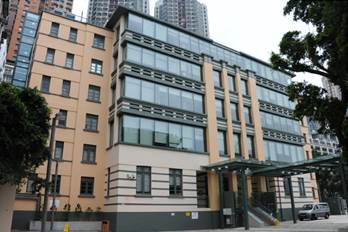
The Department of Psychiatry of Queen Mary Hospital (QMH) was established in 1972. It is situated at Block J, QMH. The Western Psychiatric Centre (WPC), 2/F-4/F of South Wing and 2/F of North Wing of David Trench Rehabilitation Centre (DTRC), has been incorporated to the Department since 1 October 1993. In line with the regionalization of medical services in Hong Kong, the Department provides comprehensive service to the Central, Western and Southern regions of Hong Kong, as well as the outlying islands (except Tung Chung New Town).
Regarding hospital-based service, there are total four wards (Adult (Male), Adult (Female), Child and Adolescent, and Psychogeriatric) for the patients who are in need of in-patient psychiatric management. An extensive range of treatment is provided: pharmacological treatment, psychotherapy, physical care, individual and family psychoeducation and counselling, rehabilitation, psychosocial interventions and spiritual support. Special investigations and treatment, including electroconvulsive therapy (ECT), transcranial magnetic stimulation (TMS) and electroencephalogram (EEG), are also available.
The out-patient clinics are located at 2/F of Block J of QMH and 3/F of DTRC, delivering psychiatric specialist out-patient service with coverage of a wide-range of different subspecialties including General Adult Psychiatry, Child and Adolescent Psychiatry, Old Age Psychiatry, Community Psychiatry, Substance Abuse, Sleep Disorder, Comprehensive Child Development Services (CCDS), Psychotherapy, Early Assessment Service for Young People with Early Psychosis (E.A.S.Y.) Programme and Neuropsychiatry. Besides, the clinic organizes talks and seminars on mental health for the patients, carers and the public.
Apart from clinics, there is an array of community psychiatry facilities at DTRC: the Adult Psychiatric Day Hospital (composed of Adult Day Centre and the Phoenix Clubhouse) as well as the Psychogeriatric Day Centre offer community rehabilitation for recovery.
The Child and Adolescent Psychiatric Day Centre is located at J5 of QMH, which provides individual assessment and training groups to patients of different ages with various diagnoses. Since 2018, to cope with the rapid expansion of service in Child and Adolescent Psychiatry, the day service has been extended to Tsan Yuk Hospital (TYH), which provides Nurse Assessment for triage and management of complex / neurodevelopmental cases, and multidisciplinary group training. Group training, community education and training programmes are regularly held for the Child and Adolescent patients and their carers.
To facilitate the care of patients with psychiatric problems in the community, the Department provides outreaching services to old age homes, hostels for mental handicapped, Education Bureau and non-governmental organisations (NGOs). The Department has a long tradition of providing care by a multidisciplinary approach; team members include psychiatrists, psychiatric nurses, medical social workers, clinical psychologists, occupational therapists, physiotherapists, speech therapists, Hong Kong Red Cross Hospital School teachers and dietitians.
The Department also has close collaboration with the Department of Psychiatry, the University of Hong Kong in providing undergraduate and postgraduate teaching and clinical research.
Our Services
The department provides multiple subspecialty psychiatry services through six clinical teams:
General Psychiatry Team 1 (including Consultation-liaison and Substance Abuse Service)
- Consultation-liaison Service is provided to Accident and Emergency Department (A&E) of QMH, in-patient wards of QMH and other cluster hospitals.
- Through pharmacological and psychological treatment, Substance Abuse Service is provided to patients suffering from substance abuse disorder comorbid with other psychiatric disorders.
General Psychiatry Team 2 (including Sleep Disorder Clinic)
- The team provide in-patient, out-patient and day-patient services for adults aged 18 to 64 years and sleep disorder consultation services.
Child and Adolescent Psychiatry Team (including Comprehensive Child Development Service (CCDS) and Psychotherapy Team)
- Child and Adolescent Psychiatry Team provide comprehensive psychiatric services coverage including in-patient, out-patient and day-patient services. The target patients are those under the age of 18 in the regions of both Hong Kong West Cluster and Hong Kong East Cluster.
- In order to facilitate the effective transitions of care across the mental health services, the team will continue comprehensive service to those patients with ADHD / ASD in Transition Clinic before transferring to Adult ADHD / ASD clinic.
- Other disorder specific clinics include:
- Adolescent Clinic
- Eating Disorder Clinic
- Tourette Syndrome and Tics Disorder Clinic
- Perinatal women are under the care of CCDS.
- Psychotherapy team takes care of patients with needs for intensive psychotherapy of different modalities. Besides, equipping the psychiatric trainees with psychotherapeutic skill is another important role of this team.
Community Psychiatry Team
- Community Psychiatry Team provides supervision and care to the patients living in the community, especially those who require intensive support. Home visit, outreach and crisis intervention services will be provided if necessary, for example for people who are suspected to have mental illness but are not willing to attend a clinic.
- It also has close liaison and working relationship with the Social Welfare Department and NGOs which provide psychiatric rehabilitation facilities in the community, e.g. halfway houses, Integrated Community Centre for Mental Wellness (ICCMW).
Psychogeriatric Team
- Psychogeriatric team provides care to elderly patients who suffered from mental illness via various settings including in-patient, out-patient clinic, Psychogeriatric Day Centre and outreaching services to designated Care and Attention Homes and private old age homes.
Early Psychosis Team
- The team takes care of patients aged 15 to 64 with first episode of psychotic disorders.